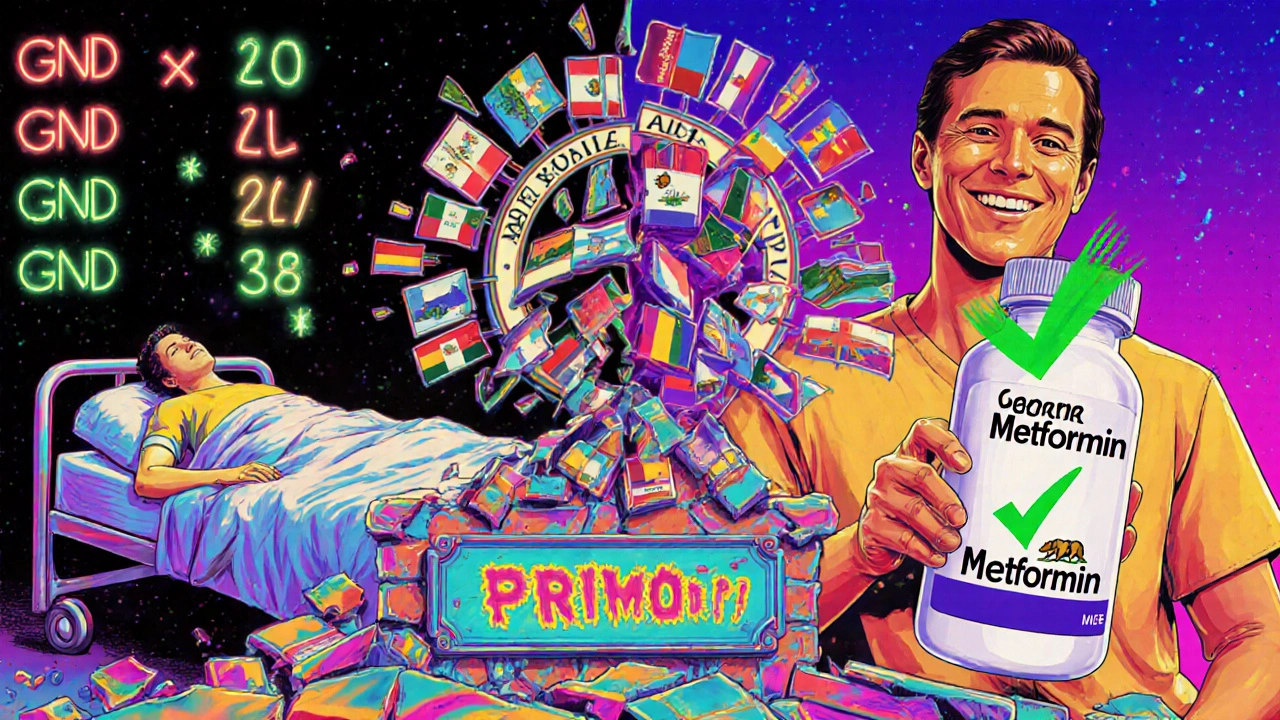Imagine you’ve been taking generic metformin for years to manage your type 2 diabetes. Your doctor writes the prescription, you walk to the pharmacy, and then you’re told: "We can’t fill this until your insurance approves it." That’s not a mistake. It’s happening more often than you think.
Generics are supposed to be the easy, affordable option. They’re chemically identical to brand-name drugs, cost 80-90% less, and make up 90% of all prescriptions filled in the U.S. But now, insurance companies are requiring prior authorization for many of them - even ones like lisinopril, levothyroxine, and atorvastatin that have been standard first-line treatments for decades.
Why Are Insurers Blocking Generic Drugs?
It sounds backwards. Why would a company that claims to want lower costs suddenly put up roadblocks for the cheapest drugs available?
The answer lies in how pharmacy benefit managers (PBMs) make money. PBMs negotiate rebates with drug makers. Sometimes, they get bigger rebates from brand-name companies if they limit how often generics are used - even when those generics are the right choice. Other times, insurers use prior authorization to control which specific generic version gets dispensed. For example, if there are three versions of generic metformin on the market, your plan might only cover one - and if your doctor prescribes another, you’ll need approval.
It’s not just about rebates. Some insurers apply prior authorization to generics as part of step therapy rules. That means even if a generic is the first recommended treatment, your plan might require you to try a different generic - or even a brand-name drug - before approving the one your doctor picked.
According to a 2024 analysis by the Generic Pharmaceutical Association, 15-20% of generic prescriptions now require prior authorization. That’s up from just 5% in 2018. For high-cost specialty generics - like those used in cancer or autoimmune diseases - the rate jumps to 35%.
How the Process Actually Works
When your doctor prescribes a generic that needs prior authorization, they have to submit paperwork to your insurance company. This can be done electronically, by fax, or over the phone. The insurer then reviews whether the medication meets their criteria - things like:
- Diagnosis codes that match the drug’s approved use
- Proof you’ve tried other medications first (step therapy)
- Lab results showing why this specific generic is needed
Approval times vary wildly. Cigna says decisions take 5-10 business days. Mayo Clinic reports some cases drag on for weeks. If your doctor marks the request as “urgent,” some plans promise a 72-hour turnaround - but that’s not always honored.
Doctors aren’t just prescribing - they’re acting as paperwork clerks. A 2022 survey by CoverMyMeds found that physicians handle an average of 43 prior authorizations per week. Nearly 4 out of 10 of those are for generic drugs. One provider on Reddit said their clinic spends 17.3 hours a week just on prior auths for generics. That’s nearly a full workday lost to bureaucracy.
Who’s Affected the Most?
Patients with chronic conditions are hit hardest. People with diabetes, high blood pressure, thyroid disease, or heart failure often rely on daily generics. Delays in getting these meds can have real consequences.
A 2024 Kaiser Family Foundation case study tracked a patient whose generic metformin was denied for 14 days. During that time, their blood sugar rose from 6.8% to 8.2% - a dangerous spike that increased their risk of kidney damage, nerve problems, and vision loss. The delay wasn’t due to medical necessity. It was because the insurer didn’t approve the prescription fast enough.
Patients aren’t the only ones frustrated. A 2023 American Medical Association survey found that 93% of doctors say prior authorizations cause treatment delays. And 24% say they’ve seen patients hospitalized because of them.
Insurance Plans Are Not All the Same
Some insurers are far more likely to block generics than others. In 2024, Aetna required prior authorization for 25% of generic medications on its formulary. UnitedHealthcare was at 22%. Humana was lower, at 18%. Medicaid programs vary by state - some use automated systems that approve common generics instantly, while others still require manual reviews.
What’s more, the same drug might be approved in one state but denied in another. California’s SB 1024, which took effect in January 2025, bans prior authorization for 47 essential generic drugs - including metformin, levothyroxine, and lisinopril. Other states are following suit. As of 2025, 34 states have limited prior authorization for certain generic classes.
What You Can Do
If your generic medication is denied:
- Ask your doctor to submit the request electronically. Electronic submissions are 32% faster than fax or phone, according to a 2024 study in the Journal of the American Pharmacists Association.
- Request an “urgent” review. If your condition is unstable - like uncontrolled blood pressure or blood sugar - ask your doctor to mark the request as urgent. Some plans must respond within 72 hours.
- Get documentation. Keep copies of every denial letter, prescription, and communication. The Crohn’s & Colitis Foundation found that 67% of prior auth denials can be overturned with additional clinical notes.
- Appeal. You have the right to appeal. Your insurer must provide a clear explanation for the denial. Use that to guide your appeal. Include your doctor’s letter and any lab results that support your need for the medication.
- Ask about alternatives. If one generic is blocked, ask if another version of the same drug is covered. Sometimes switching brands within the same class works.

The Bigger Picture: Is This Sustainable?
There’s growing consensus that requiring prior authorization for common generics is broken.
The American College of Physicians says these rules should only apply in “narrowly defined clinical scenarios.” The American Gastroenterological Association says prior auth for first-line generics increases overall healthcare costs by 18% - because delays lead to ER visits, hospitalizations, and worsening disease.
In June 2025, six major insurers - including Aetna, UnitedHealthcare, Cigna, and Humana - announced they’ll eliminate prior authorization for 12 common generic medications by January 2026. The list includes ACE inhibitors, statins, and metformin. This is a direct response to pressure from doctors, patients, and lawmakers.
Meanwhile, federal law passed in December 2023 requires Medicare Advantage plans to use electronic prior authorization and respond to urgent requests within 72 hours by 2026. The Congressional Budget Office predicts a 40% drop in prior auth requirements for generics by 2028 if current reforms continue.
It’s not perfect - but it’s moving in the right direction.
What’s Next?
If you’re on daily generics, stay informed. Ask your pharmacist: “Is this medication on my plan’s prior authorization list?” If you’re prescribed a new generic, ask your doctor to check ahead of time. Don’t assume it’s automatic.
And if you’ve been denied a generic you’ve taken for years - don’t accept it. Fight it. Your health isn’t a billing code. It’s your life.
Why would insurance require approval for a cheap generic drug?
Insurance companies sometimes require prior authorization for generics to control which version of the drug is dispensed, to enforce step therapy rules, or because they receive larger rebates from brand-name manufacturers if generics are restricted. It’s not about cost - it’s about profit structure and formulary control.
How long does prior authorization for a generic usually take?
Approval times vary. Most insurers take 5-10 business days, but some can take weeks. If your doctor marks the request as urgent, some plans promise a 72-hour response - though delays still happen. Electronic submissions are faster than fax or phone.
Can I appeal if my generic is denied?
Yes. You have the right to appeal. Gather all your medical records, your doctor’s note explaining why the generic is necessary, and any lab results. About 67% of denials are overturned with proper documentation.
Which generic drugs are most likely to require prior authorization?
High-risk or high-volume generics are most affected. These include medications for diabetes (metformin), thyroid (levothyroxine), high blood pressure (lisinopril), and cholesterol (atorvastatin). Specialty generics - like those used in cancer or autoimmune conditions - have the highest approval rates, sometimes over 35%.
Are there states that ban prior authorization for generics?
Yes. California’s SB 1024, effective January 2025, prohibits prior authorization for 47 essential generic drugs. As of 2025, 34 states have restricted prior auth for certain generic classes, recognizing that it often delays care without improving outcomes.

Jennifer Walton
November 14, 2025 AT 22:27It’s not about cost. It’s about control. The system wasn’t built to serve patients-it was built to extract value from their vulnerability.
Kihya Beitz
November 14, 2025 AT 23:46So let me get this straight-we pay more for brand names because the middlemen get kickbacks? And we’re supposed to be surprised? 🤡
Katie Baker
November 16, 2025 AT 04:42This is so frustrating but thank you for laying it all out. I’ve been denied metformin twice this year. Each time, my doctor had to fight. It’s exhausting-but we’re not alone.
John Foster
November 17, 2025 AT 13:30The real tragedy isn’t the prior authorization-it’s the normalization of it. We’ve accepted bureaucratic obstruction as part of healthcare, like waiting 45 minutes for a 5-minute appointment. We’ve been conditioned to believe that suffering through paperwork is the price of access. But what if the system isn’t broken? What if it’s working exactly as designed-to make you feel powerless so you stop asking questions?
ASHISH TURAN
November 18, 2025 AT 19:18In India, generics are the only option-and they’re accessible without any paperwork. It’s strange to see a country with advanced tech still stuck in 1990s insurance bureaucracy.
Ryan Airey
November 19, 2025 AT 22:45PBMs are parasites. They don’t produce anything. They don’t cure anything. They just siphon money from patients and doctors while pretending they’re saving costs. Time to break them up.
Hollis Hollywood
November 21, 2025 AT 13:54I used to work in a clinic. I saw it firsthand. A diabetic patient skipped doses for two weeks because her metformin was stuck in prior auth limbo. She ended up in the ER. The doctor wrote the prescription. The insurer denied it. The patient cried in the waiting room. And no one in administration ever had to face her. That’s the human cost behind every checkbox on their form.
Aidan McCord-Amasis
November 22, 2025 AT 22:08They’re literally blocking cheap meds to sell expensive ones. 😒💸
Adam Dille
November 24, 2025 AT 07:08California’s law is a start. I hope other states follow. We need to treat healthcare like a right, not a negotiation. 🙏
Edward Ward
November 26, 2025 AT 00:13Let’s not forget: prior authorization for generics wasn’t always this pervasive. In 2010, less than 3% required it. Now it’s 15–20%. That’s a 500%+ increase in administrative friction over 14 years. And yet, the same insurers claim they’re cutting costs. The math doesn’t add up unless you factor in the hidden costs: patient harm, provider burnout, ER visits, lost wages, and emotional trauma. This isn’t efficiency-it’s institutionalized cruelty disguised as policy.
Andrew Eppich
November 26, 2025 AT 12:33It is irresponsible to suggest that insurance companies are acting maliciously. They operate within a complex regulatory framework designed to ensure appropriate use of medications. Prior authorization is a tool for clinical safety, not profit.
Jessica Chambers
November 27, 2025 AT 09:04My pharmacist told me last week that my levothyroxine was "not preferred"-so I had to wait 10 days. I’m 62. I can’t afford to wait. 😔
Shyamal Spadoni
November 28, 2025 AT 05:32you think this is about rebates? nah. this is a deep state thing. the big pharma & insurance cartel is using prior auth to control the population. they want you dependent on expensive meds so you stay docile. also, the 2023 federal law? totally a distraction. they’re planting seeds for digital ID health tracking. next thing you know, your insulin will be locked behind a blockchain key. 🤫